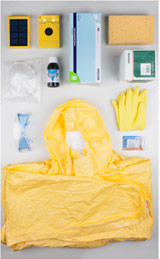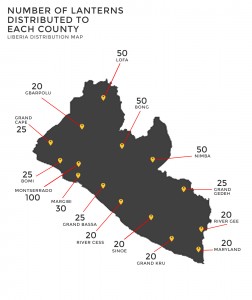The Role of Solar Lanterns in the Fight Against Ebola

With over 21,000 infections and more than 8,000 deaths from the Ebola virus since the beginning of the outbreak in 2014, health care facilities in West Africa are strained beyond capacity. As overcrowded hospitals and clinics are forced to turn away many of those seeking treatment, the infected spread the disease to those caring for them at home. Sean Casey, emergency response team director for the International Medical Corps (IMC) explains, “every week that we don’t open new facilities, we create the need for several more.”
New clinics are being built and existing ones expanded as quickly as possible to care for the ill and to contain the disease, but staff and supplies are desperately needed. A reliable light source is one of the things often lacking in these clinics, forcing health care workers to resort to the use of flashlights, kerosene lamps, and even candles. The inconveniences and health risks associated with these lighting sources in general are compounded when treating Ebola patients. Médecins Sans Frontières (MSF)’s strict infection control measures require ‘sufficient lighting’ to ensure the safest possible working environment.
Stefan Liljegren, MSF’s field coordinator for a new 160-bed Ebola treatment center in Monrovia explained to The Telegraph that handling Ebola patients requires extreme care at the best of times to prevent infection of the health care workers, and would be dangerous in the dark.Thus, the clinic doesn’t accept new patients after dark, even when this means some die just outside the gates awaiting a chance to be admitted at daybreak.
 As a response to this urgent need for reliable lighting, the Liberian Rural & Renewable Energy Agency (RREA) donated 500 solar lanterns in August to the Ministry of Health for distribution to the Ebola Response Teams working in rural areas of Liberia, where the electrical grid is unlikely to reach. The donation was made by the Lighting Lives in Liberia Project, which is financed by the Global Environment Facility (GEF), and administered by the World Bank with support from Lighting Africa.
As a response to this urgent need for reliable lighting, the Liberian Rural & Renewable Energy Agency (RREA) donated 500 solar lanterns in August to the Ministry of Health for distribution to the Ebola Response Teams working in rural areas of Liberia, where the electrical grid is unlikely to reach. The donation was made by the Lighting Lives in Liberia Project, which is financed by the Global Environment Facility (GEF), and administered by the World Bank with support from Lighting Africa.
The lanterns are intended for use in remote communities in each of Liberia’s 15 counties.The lanterns can provide light to clinics without electricity, or serve as a backup in case of power outages or generators that fail or have or run out of fuel. They also have the capacity to charge mobile phones, allowing health workers to stay in close communication.
WakaWaka is also responding to the crisis by providing their solar lights, which meet Lighting Global Quality Standards, to national and international NGOs for distribution to local health care facilities in Liberia and to include in Ebola prevention kits.
If you would like to donate solar lanterns to clinics in the affected countries, you can do so via WakaWaka or contact us for information on coordinating donations.

